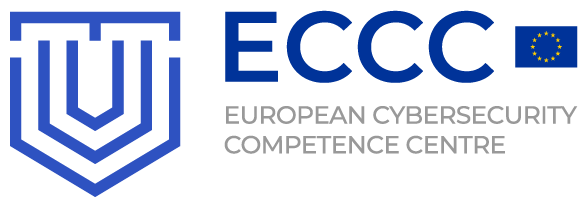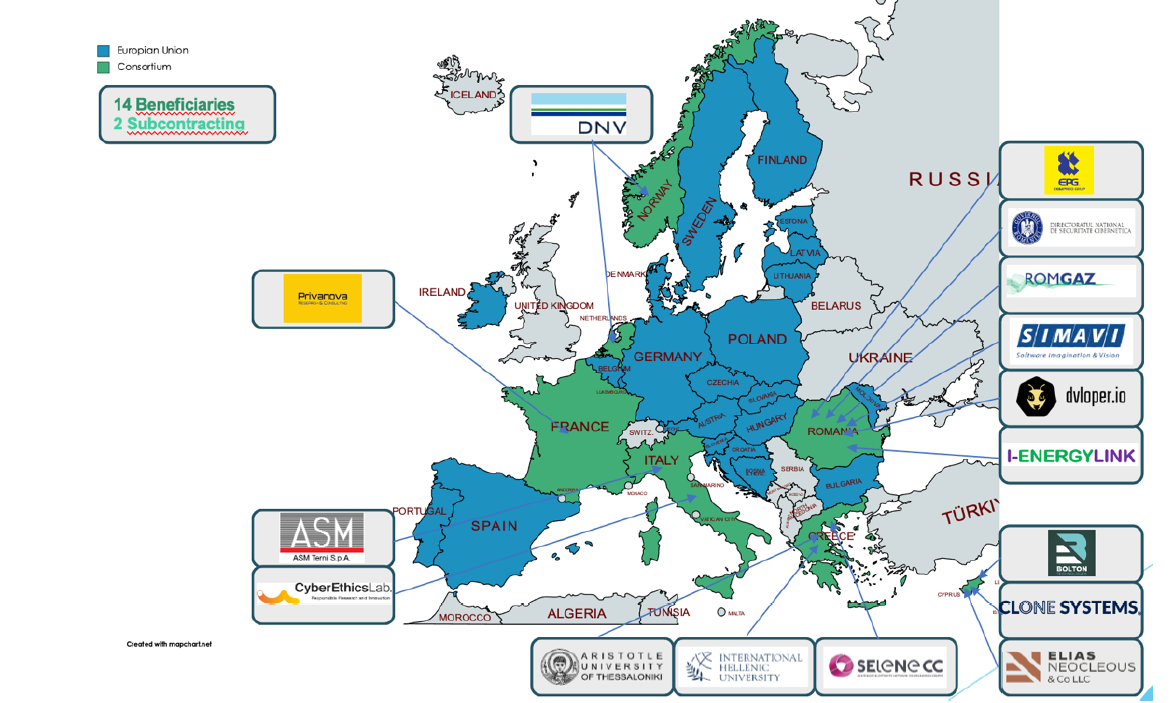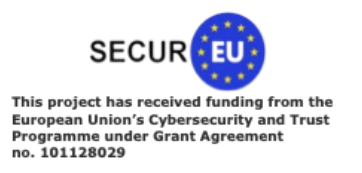

Project title:
„Enhancing Security of European SMEs in Response to Cybersecurity Threats”, acronym SECUR-EU
Financing source:
The project is financed by the Digital Europe Programme (Digital Europe Programme - DIGITAL), under call DIGITAL-ECCC-2022-CYBER-03, action type DIGITAL JU SME Support Actions.
Implementation period:
36 months, starting December 1, 2023.
Total value of the project:
EUR 3.777,100, of which the eligible non-reimbursable amount is EUR 2,437,687.13.
Consortium:
Coordinator: EXIMPROD ENGINEERING S.A. - Romania
Partners:
- Aristotelio Panepistimio Thessalonikis, ARISTOTLE UT – Greece;
- ASM TERNI SPA, ASM TERNI – Italy;
- Bolton Technologies Limited, BOLTON – Cyprus;
- CLONE Systems CY LTD, CLONE – Cyprus;
- Cyberethics LAB SRLS, CEL – Italy;
- Directoratul Național de Securitate Cibernetică, DNSC – Romania;
- DNV Netherlands BV, DNV – Olanda;
- Elias Neocleous and CO. LLC, ELIAS – Cyprus;
- Diethnes Panepistimio Ellados, IHU – Greece;
- Societatea Natională de Gaze Naturale Romgaz SA, ROMGAZ – Romania;
- Software Imagination & Vision SRL, SIMAVI – Romania;
- Southeast Electricity Network Coordination Center Selene CC ANONYMI ETAIREIA, SEleNe-CC – Greece;
- SQS Business Services SRL, DVLOPER.IO – Romania;
Subcontracted partners:
- I-ENEGYLINK – Romania;
- PRIVANOVA, - France.

The project aims to:
The SECUR-EU project aims to promote a common culture of cybersecurity awareness of security solutions for small and medium-sized enterprises (SMEs). SECUR-EU goals and targets include enhancing open-source (OS) security projects to reach a enterprise level security, to provide open-source security solutions on the SMEs market and to enhance white-hack testing trchniques through the HackOlympics initiative.
SECUR-EU will address the challenges of increased attacks on critical infrastructure and SMEs. The challenge for SMEs to strive to secure their environments will be addressed by leading contributors providing them with enterprise-level OS security solutions. . SMEs will use and develop their security solutions based on two categories:
- Attack solutions: scanning and penetration testing tools (OS and enterprise) from different domains developed to perform actual attacks on critical infrastructure.
- Defense solutions: next-generation SIEM/IPS/IDS systems developed to track anomalies on a critical infrastructure network.
The SECUR-EU Consortium will design and develop a threat intelligence framework for comprehensive critical infrastructure protection by:
- Detection and classification of attacks from sophisticated threat actors on critical infrastructures, including dedicated adversary simulation sessions;
- Penetration testing tools and techniques that address future vulnerabilities, artificial intelligence (AI) algorithms used for vulnerability estimation;
- Next generation interconnected intrusion detection systems (IDS) using predictive AI models to detect and prevent sophisticated attacks;
- Decentralized information sharing system based on P2P network communication protocol, cryptographic algorithms used between data transfer layers;
- AI-enhanced technology will maximize the ability of the SECUR-EU solution to predict, detect and analyze future threats;
- User-centered dashboard that allows stakeholders to interact with developed components.
Strategic objectives:
- Supporting the market and improving the quality and dissemination of innovative cyber security solutions;
- Improving knowledge and audit of cyber security training;
- Training mainly SMEs and public organizations in the EU in cyber security capabilities, through support measures addressing both the demand and the offer;
- Improving capacities and further developing EU-funded open-source tools with up-to-date functionalities;
- Demonstration of the SECUR-EU framework and methodology in operational environments;
- Supporting hackathons, cyber security challenges and conferences and engaging relevant stakeholders, including software development communities;
- Promoting acceptance of SECUR-EU solutions at ethical, legal and social level.
SECUR-EU:

Despre noi
Romgaz undertakes geological exploration in order to discover new gas reserves, produces methane by exploiting the reservoirs included in the company portfolio, stores natural gas in the underground deposits, interventions, workover and special operations on wells and technological transport.
